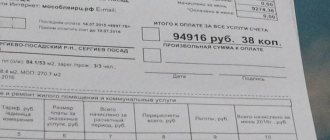Rent arrears
Dear readers! The article talks about typical ways to resolve legal issues, but each case is individual. If you want to find out how to solve your particular problem , contact a consultant:
8 (800) 700 95 53
APPLICATIONS AND CALLS ARE ACCEPTED 24/7 and 7 days a week.
It's fast and FREE !
If a person has not paid the rent by the 10th day of the month (in accordance with Article 155 of the Housing Code of the Russian Federation) following the previous month, then from the 11th day the debt will be accrued, and a penalty for each day of delay.
The utility company does not immediately file a claim in court for forced collection of debt.
The first preventative measure is to notify the consumer about the debt. The document proposes to repay the debt within a specified time.
If no action is taken by the person, then he may be disconnected from utilities until the debt is paid. Only after the debt has been fully repaid will the tenant be able to use the service again.
Here is a sample notice of debt on utility bills.
If all measures to resolve the conflict in a pre-trial manner have failed, the housing office has the right to go to court. According to the court decision, after the opening of enforcement proceedings, the bailiffs collect the amount of the debt forcibly.
If it is impossible to pay the entire debt, a person can enter into an installment agreement with the utility service for the debt for utility services.
This agreement involves paying the debt in installments over a period of time specified in the agreement, and no penalties will be charged for the period of the agreement.
Checking the payment of utilities will help determine the correctness of the rent calculation. What is the penalty for non-payment of utility bills? See here.
What can utility companies do when collecting debts?
According to Article 155 of the Housing Code of the Russian Federation, payments for residential premises and utilities must be paid by the 10th of the next month.
This means that the counting of the number of days of delay begins from the next day after the due date for making payment. As soon as a delay occurs, so-called “penalties” are charged on the existing amount of debt. Sometimes utility companies are still ready to accommodate the debtor, for example, when the latter has really good reasons for delay. The judge will definitely take these circumstances into account during the proceedings. Among the good reasons that allow an apartment owner to skip a certain number of mandatory payments are:
- Long-term illness with cessation of salary payments;
- Dismissal from work due to liquidation of the enterprise or reduction of staff;
- Delay in payment of wages;
- Difficult financial situation of family members.
That is, if the monthly rent amount is more than 22% of the total earnings of all family members living in the apartment, you have the opportunity to apply for a subsidy. This will allow you to pay utility bills in a much smaller amount until you overcome a difficult financial situation.
The debtor is notified in advance of a possible limitation of utility services, and the service is resumed when the debt is repaid. If a person pays all receipts on time and has been disconnected from utilities, it is necessary to contact the Housing Office with an application to resume the provision of services. It is also worth pointing out that for the period in which services were not provided, a recalculation must be made.
Utility companies have many responsibilities. But if the owner, in turn, does not comply with the terms of the contract, utility workers have rights. First of all, the possibility of collecting rent arrears and bringing the defaulter to justice. So, the apartment manager has the right:
- In order to psychologically influence the debtor, management company employees post information about the debt on a notice board in a publicly accessible place. As a rule, such a measure has a significant impact on emotionally sensitive people. Also, information about unscrupulous payers is published in local media (although moral damages can be recovered from the management company for false information);
- accrual of penalties - a penalty is charged in the established amount and amounts to one three hundredth of the rate
- refinancing (Central Bank of the Russian Federation). The amount seems small, but paying the fine late will hit your wallet;
- restriction of access (or deprivation of the right to use) specific utilities (gas, hot water, electricity, etc.);
- turning to collectors is a rare occurrence to collect rent arrears. However, similar cases have already occurred in judicial practice. Moreover, the court makes ambiguous decisions, both in favor of the plaintiff and the defendant;
- deprivation of the right to use living space for its intended purpose - in other words, eviction. Today, people can be evicted by court decision and only from a municipal apartment.
Before applying any of the above methods of punishment for delays, the management company will organize preliminary work with the debtor. For all questions, you can get advice from practicing lawyers. To do this, leave a message via the feedback form.
about the author
Valery Isaev
Valery Isaev graduated from the Moscow State Law Institute. Over the years of work in the legal profession, he has conducted many successful civil and criminal cases in courts of various jurisdictions. Extensive experience in legal assistance to citizens in various fields.
Often, in times of financial crisis, people do not have enough money to pay even utility bills on time. In addition, constantly rising tariffs make it difficult to pay bills on time. As a result, people develop debts that grow every month and become more and more unaffordable for the payer.
As soon as payment is delayed (usually the 10th of the next month), a penalty begins to accrue on the unpaid amount. According to Part 14 of Art. 155 of the RF Housing Code sets its size. This sanction should encourage the debtor to quickly fulfill his obligations to pay utility bills.
Consequences
The main consequences of non-payment of utility bills are:
- accrual of penalties for each day of delay;
- limitation or disconnection of utilities;
- eviction from the apartment.
Disconnection of housing and communal services
If a debt arises, the supplier has the right, in case of non-payment of payments, to disconnect or suspend the provision of [Resolution of the Government of the Russian Federation of May 23, 2006 No. 307[/anchor]).
A month before the disconnection, the consumer receives a notification about a possible disconnection. In this case, it is necessary to pay off the debt.
Here you can download a notification about disconnecting services.
If payment has not been made, then a signed letter will be sent two days in advance notifying you of the disconnection.
Resumption of services is possible within two days from the date of payment of the debt. Re-connection is paid.
By law, you cannot disconnect from the following utilities:
- heating;
- cold water.
According to Government Decree No. 549 dated July 21, 2008, the gas supplier may suspend the provision of services unilaterally if the consumer has not paid the payment within three months.
Disconnection is carried out only upon warning to the consumer:
- first time - within 40 days;
- the second - over 20.
Deprivation of housing
Only persons who live under social rent in a municipal apartment can be evicted from an apartment (Article 90 of the Housing Code of the Russian Federation). It is impossible to evict the owner of the apartment, because in this case the right of ownership is violated.
If tenants have not paid utility bills for 6 months, they are subject to eviction.
This decision can only be made by a court. When considering the case, the court takes into account the reasons for the debt; if they are valid, the court will provide a period during which it will be necessary to repay the debt.
If the court has made a decision on eviction, in this case:
- tenants must be provided with alternative accommodation;
- Each family member must have at least 6 sq.m.
What can utility companies do when collecting debts?
about the author
More often than not, company employees are loyal to this situation, considering such measures to be ineffective. Non-payment may occur due to the tenant's illness or departure. But we must remember that according to Resolution No. 354, the company supplying utilities has the right to suspend them if debts for utilities have not been repaid by defaulters for more than two months.
What is the statute of limitations for housing and communal services debts in Russia? If the statute of limitations for housing and communal services debts has expired in 2020, it means that the last payment on receipts was made no later than 2014. In such circumstances, the statute of limitations law favors the debtor. So, the response algorithm should be like this: My site -
This point becomes the key mistake of the plaintiff - after all, the law establishes a statute of limitations for rent arrears. Accordingly, it is not possible to collect the required amount of arrears. Let’s look at these nuances in more detail and find out the details that “reduce” the debtor’s obligations. Content
The court made a decision to fully repay the debt for housing and communal services, legal costs and the management company’s lawyer for the work... Is it possible, after the court’s decision, to agree with the management company to repay the debt in parts, i.e. do debt restructuring? The Criminal Code lawyer must convey the court decision to the bailiffs. Please tell me what can be done in this case?
Eviction threatens, first of all, tenants of municipal housing under a social tenancy agreement. For apartment owners (the apartment was acquired under the terms of donation, purchase, inheritance, and also privatized), this measure is applied extremely rarely due to the difficult feasibility of this procedure.
Many people with low incomes cannot pay utility bills on time or do not pay them in full. The situation is complicated by the constant increase in tariffs, despite the fact that the amount of wages or pensions remains the same. Because of this, a person develops debt, which constantly increases, and it becomes more and more difficult to pay it off.
It turns out that payment has not been made for 4 months, and the consumer continues to use the services, even if not always in full. Next, the management company, housing department, housing department, homeowners association, EIRC will most likely file a claim in court, which is subject to consideration within 2 months (and in the case of an examination, this period is extended for an “indefinite” time).
If the apartment is not private property, then the law allows the defaulter to be evicted from the living space he occupies, without exempting him from paying the debt. If less than six months have passed since the payment of any amount to pay for housing and communal services, the Criminal Code still has no grounds to seek judicial assistance.
We invite you to familiarize yourself with: Sample of filling out a claim for non-compliance with the terms of the contract
Of course, the management organization will try at first to somehow influence the debtor and demand voluntary repayment of the debt; most likely, actions will be taken to limit or turn off utilities, but sooner or later, when all methods have been tried but do not produce results, the management company will simply sue and will collect the amount of debt from the debtor in court.
You can submit an application to the head of the management company or to the chairman of the residents' association in order to achieve: The management company has filed a lawsuit for non-payment of utilities. At this time, it is still possible to resolve the matter amicably and without going to court. This is beneficial not only for the management company, but also for the debtor. Negotiations should establish whether the company is ready to restructure the existing debt.
Tariffs for services of resource supply companies constantly demonstrate positive dynamics, which provokes the emergence of such a phenomenon as non-payment of utilities.
- setting resource consumption limits;
- calculating penalties on existing debt;
- eviction from the premises due to the occurrence of large amounts of debt.
- disconnection from the service;
Penalties are an amount that is calculated depending on the size of the debt.
In accordance with Order No. 365 dated March 28, 1988 issued by gr. RSFSR Sergei Borisovich Efimov, on the basis of the decision of the executive committee of the regional Council of People's Deputies of March 29, 1988 No. 142 and the decision of the housing commission under the regional executive committee, real estate at the address Rybinsk st. Motorostroiteley d.
- Related Posts
- Is the 2020 capital improvement law in effect or not?
- What is needed to replace a passport at 20 years old for a man
- Until what time can repairs be done in Irkutsk?
- I'm a Mother of Many Children What I'm Expected to Do in 2020
If the defendant, notified of this, did not appear in court, and did not report valid reasons for failure to appear, or did not ask to consider the case without him, the case may be considered in absentia proceedings (Chapter 22 of the Code of Civil Procedure of the Russian Federation), if the plaintiff is against this doesn't mind. But often debtors deliberately delay the proceedings by not appearing in court and refusing to sign for receipt of the summons. In this case, the judge may issue a summons to the plaintiff for delivery to the debtor (Article 115
Code of Civil Procedure of the Russian Federation). He is obliged to return the counterfoil of the summons to the court with a receipt from the addressee for its receipt. If the debtor refuses to accept the summons, the management organization makes a note about this on the summons. It is recommended to draw up an act of refusal to accept the summons.
A debtor who refuses to accept the summons is considered to have been notified of the time and place of the trial.
In the notification to the debtor, the Management Company indicates the following:
- business name and address;
- date of the notification;
- registration number;
- debtor's address;
- amount of debt;
- liability information;
- debt repayment terms;
- signature and seal of the company.
Collection procedure To collect a debt for utility services, the service organization must adhere to the following algorithm of actions:
- Written notice to the debtor. Once a 3 month delinquency occurs, a notice must be issued to the defaulter. Issued in person or sent by mail. In the document, indicate important information - the amount of debt, payment terms, etc.
- Payment by the debtor.
As an option, the defaulter apologizes to the Management Company and repays the debt in full. The claims against him are withdrawn.
The amount of the fine for non-payment of utility bills in 2020
The State Duma adopted a bill to increase penalties, according to which the fine for non-payment of utility bills from 2020 will be not 1/300, but 1/700 of the refinancing rate of the Central Bank of the Russian Federation. This means that the fine is doubled.
Penalties will be accrued from the 91st day of non-payment of utilities.
In addition, now the responsibility lies not only with the consumers of services, but also with the organizations that provide them. Thus, in particular, liability will arise for incorrect calculation of payment documents.
A fine will also be imposed for providing low-quality services or providing services with long interruptions.
Penalty
A penalty is charged for each day of late payment from the day the person stopped paying for utility services.
If the receipt arrived late, as a result of which it was not possible to pay the payment on time, you should contact the utility company to obtain a certificate stating that the receipt arrived later. In this case, no penalty will be charged.
Article 155, paragraph 14 of the Housing Code of the Russian Federation establishes the obligation to pay penalties in case of late payment.
It is worth noting that when paying through the terminal, you will not be able to pay the resulting fine, and accordingly the debt will only grow.
Therefore, the penalty must be paid either at the bank’s cash desk or at the housing office.
How much debt for housing and communal services is sued?
Since June 2020, the procedure for collecting debt for housing and communal services has been simplified. When submitting documents, the court makes a positive decision within 5 days without a public hearing. The debtor is given 10 days to cancel the court order - to do this, it is enough to write a statement indicating that the calculation is incorrect or the claims are unfounded. In this case, the decision will be reversed and the utility will need to re-file the claim. After this, the case will be considered in a general manner with both parties summoned.
They will also have to answer to the law. Not all property owners know that failure to pay utility bills can threaten them with serious troubles, including litigation. Then the management company, which has entered into an agreement for the technical operation and utilities of the house, may demand that the unscrupulous tenant be evicted.
How to avoid problems?
If the consumer has received a notice of debt, they should first contact the utility service to reconcile payments.
Here you can download a sample application to the management company on the procedure for calculating utility bills.
To ensure that the service provider does not disconnect you from receiving utility services, you must take care of this in advance and contact the housing office with a request for an installment payment plan for a certain period.
Installments are mandatory if the payment amount for a certain period has increased by 25% compared to the same payment period last year. The housing office will divide the resulting debt into 12 months and will include part of the debt in each month.
However, in this case, the consumer will also pay a fee for using the installment plan, which should not exceed the refinancing rate of the Central Bank of the Russian Federation multiplied by 3.
In addition, disconnection from utilities is possible only when the rest of the residents of the house do not suffer from this, so it is impossible to turn off the heating and cold water supply.
Collection of debts for utility bills is carried out in court. Are you interested in the timing of issuing a certificate of no debt on utility bills? Read here.
How to make utility payments online? Details in this article.
When can you not pay?
According to the new law on increasing penalties, the fine will be paid not only by residents, but also by utility companies, and payment of the fine will be transferred to the residents:
- For incorrect calculation, the penalty will be 200 rubles.
- For the provision of low-quality services, the consumer may be refunded about 30% of the average monthly payment for utility services.
The average monthly payment will be calculated based on the last 6 months of payments.
In addition, if there are constant power outages or gas is turned off, the consumer may not pay for such a service, because it was not provided.
If the quality of services does not meet the standards, then the consumer may qualify for a reduction in the monthly payment.
However, in order to prove that the service was provided with poor quality, it is necessary to have evidence, namely to record this point.
The recording can be carried out either by a utility company or by a public organization that protects consumer rights. Based on the results, a report will be drawn up, which can be presented in court as a means of evidence.
But the issue can also be resolved out of court, by writing a claim to the utility company demanding compensation for the penalty.
In this case, we mean to reimburse the funds, but residents cannot refuse to pay for the services provided; this is their responsibility.
What to do if you have nothing to pay?
If a tenant has a difficult situation in which they have nothing to pay for utilities, they must contact the social service to receive financial assistance from the state.
There is also another way - to contact the Housing Office with an explanation of the reason for such non-payment and confirmation that this reason is valid (delay in salary, illness of one of the family members).
In this case, the consequences of non-payment of utilities will not be applied to the person.
How to win a trial
The defendant’s course of action directly depends on the procedural features of filing the application. For example, the management company may apply to the court for a special order. But this can only be done if the amount of debt does not exceed 500,000 rubles. In this case, the judge does not invite the parties to the dispute to the court hearing, but makes a decision independently. The debtor, in turn, has the right to cancel the court order in the manner strictly established by procedural legislation.
The management company may demand to recover from the debtor not only the principal amount of the debt, but also all fines and penalties imposed. To do this, she will have to draw up and submit a statement of claim to the court. So, what should the defendant do in such a situation?
- Study the plaintiff’s claims and check all calculations made;
- Request from the plaintiff documents confirming the accrual of payments;
- Prepare documents serving as evidence of depositing funds (payment receipts);
- Prepare and submit a written objection;
- Offer the plaintiff to enter into a settlement agreement.
Extenuating circumstances
Judicial practice shows that when considering cases of debts for housing and communal services, some mitigating circumstances are taken into account in the form of evidence of significant reasons for the occurrence of debt.
Of course, these will have to be documented, so the owner of the apartment must immediately address this issue as soon as he receives a subpoena. Good reasons for incurring debts may include:
- Long-term illness with or without hospitalization, during which wages were not accrued;
- Dismissal of the payer from his place of work through no fault of his (liquidation of the enterprise, layoff of employees, etc.);
- Long delay in payment of wages;
- Difficulties with financial situation due to other circumstances.
In addition, if the reasons listed above are present, if in addition to this the amount of rent is more than twenty-two percent of the monthly income of the defaulter’s family, in order to avoid bringing the situation to court, it is advisable to issue a subsidy. This will solve the difficult financial situation and reduce the rent by six months.
The date of the court hearing is set by the court, as stated in the summons. It should be borne in mind that the prosecutor will prepare papers that will indicate the guilt of the defendant.







